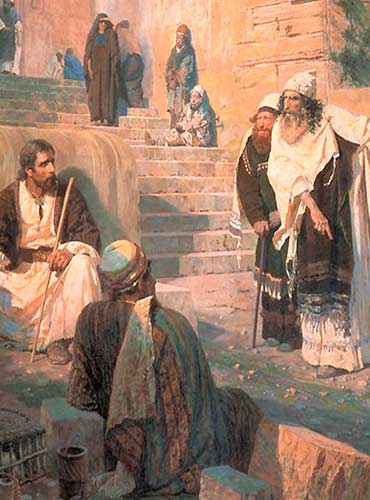Friday of the Fifth Week of Lent – Jn 10:31-42
Today’s Gospel stands in stark contrast to the first reading. In the midst of his sufferings, Jeremiah asks God: “Let me witness the vengeance you take on them, for to you I have entrusted my cause.” The prophet has suffered a great deal, but, remaining firm in his faith in God, expresses a desire for vengeance to be taken.
We can contrast this with Christ’s reaction in the Gospel, which begins in media res and presents “the climax of Jesus’ encounters with Jewish authorities” (NABRE commentary): two details about the setting are very important, even though they aren’t included in today’s reading. First, John tells us that this encounter takes place in the winter “on the feast of the Dedication.” In other words, the Jews were celebrating Hanukkah, which commemorates how God liberated the Jews through the Maccabees and allowed them to re-dedicate the temple. Secondly, John adds that Jesus was walking in “the temple area on the Portico of Solomon,” an area on the Temple’s eastern side that dated back to Solomon’s time. According to the Jewish tradition, the Messiah was supposed to enter the Eastern gate, and so the scene could hardly have been more poignant. The Jews have gathered to celebrate God’s liberation and goodness, and here Jesus walks on the Messiah’s side of the temple, built by the embodiment of wisdom in the Old Testament. The Jews ask Him, “Are you the Messiah?,” and Jesus, in reply, tells them, “The Father and I are one.” It is here, with the angry Jewish response, that our Gospel begins.
One wonders why the Jews asked in the first place: they would’ve been angry and disappointed if Christ had said no, and when the answer was yes, they still got angry. Yet, notice Jesus’ reaction. Rather than get angry, or call for vengeance, he instead explains, and pleads with them to believe. This is quite a contrast with Jeremiah, and it shows precisely how concerned Christ is with bringing the Jews to salvation. Ultimately, though, they respond angrily, and so Jesus returns to the place where John the Baptist first baptized, where the first seeds of repentance and the Gospel were sown and were well received. Even after all the years of public ministry, Jesus, in a sense, finds Himself at the beginning, in the place and with the simple people who choose the path of repentance and forgiveness, with the Jewish leaders, disbelieving and far away.
What does this mean for us and our lives? What really strikes us is just how merciful Jesus is, and how He tries time and time again to bring others back to the Father. It’s not the time for vengeance and anger, but for mercy, so much so that from the cross Jesus will beg His Father to forgive His executioners.
In our lives, this message of forgiveness is particularly important as we enter into Holy Week. Forgiveness is simply love practiced among people who love poorly. It is also, as Pope Saint John Paul II said, “above all a personal choice, a decision of the heart to go against the natural instinct to pay back evil with evil.” To forgive means, not to forget the wrongs that have been done us, but to look beyond them, and to pray and desire the salvation of those who inflicted them. When we can do this, then we come to resemble our Heavenly Father, who desires the conversion and salvation of sinners so much that He sent His only-begotten Son to suffer and die for them. We can ask ourselves: do we still hold any bitterness and resentment in our hearts? Have we really forgiven those who have hurt us?
Today, let us ask, through the intercession of Mary, Refuge of Sinners, for the grace to forgive and so be like our Father in heaven.






